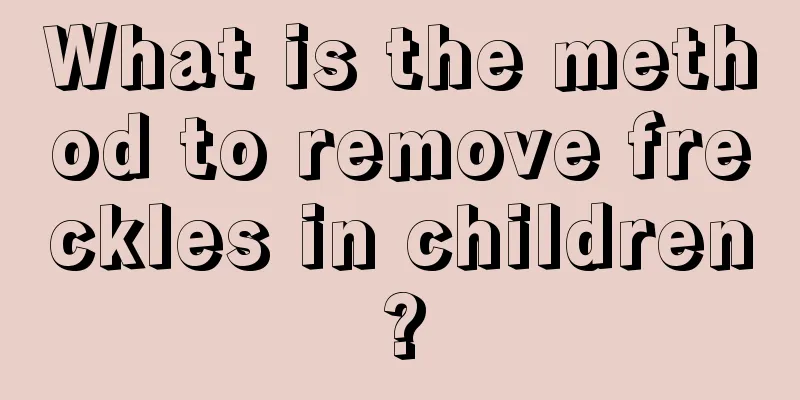How many months has the baby stopped spitting up milk?

|
We all know that when the baby is just born, the gastrointestinal tract is not fully developed, so there will be spitting up of milk when feeding. This often makes parents very worried, fearing that the baby will put a burden on the stomach and intestines if he eats too much every time. In fact, this is generally a normal phenomenon, so when such symptoms appear, as the baby grows older day by day, this symptom will be effectively improved. Let's find out how many months it will take for the baby to stop spitting up milk. How many months does the baby not spit up milk? Normal babies born soon after birth will have spitting up of milk to varying degrees. As the baby grows day by day, during the period of 4 to 6 months, the phenomenon of spitting up and regurgitating milk will slow down, especially after 6 months old, as the baby's stomach capacity increases and complementary foods such as rice porridge are added. These foods have considerable viscosity, so the phenomenon of spitting up and regurgitating milk will naturally decrease. A large amount is called spitting up, and a small amount is called spitting up. Spitting up milk often occurs when the baby has just finished feeding, and the spitting out usually stops after one or two mouthfuls, so don't worry too much. Spitting up milk is far less serious than vomiting. Reasons why babies spit up milk include: 1. Physiological reasons: The stomach of a baby is not slanted downward like that of older children and adults, but is in a horizontal position. This will reduce the stomach's capacity and allow it to store less food. The milk taken in through the mouth first passes through a tube called the esophagus and then enters the stomach. The baby's stomach has two "gates", the cardia and the pylorus. The one connected to the esophagus is called the cardia, which is the entrance to the stomach, and the other one connected to the intestine is called the pylorus, which is the exit of the stomach. The baby's pylorus is generally tightly closed and can be easily stimulated by food and cause spasms, which makes the exit resistance greater and makes it slow or difficult for food to pass through. Food refluxes from the pylorus to the cardia. Since the tension of the esophageal muscles of infants and young children is low, the cardia is relatively loose and not tightly closed, making it easy for food to "break out". 2. Pathological causes of colds. Due to coughing, abdominal pressure increases, and vomiting is often accompanied. Infect. Epidemic diarrhea, hepatitis, otitis media, pneumonia, sepsis, and meningitis are also causes of vomiting in neonates. constipate. If bowel movements are very rare or the excretion of meconium is prolonged, abdominal distension and vomiting may also occur. As the baby grows day by day, his body will become healthier and healthier, and his living habits will gradually become regular. The above is an introduction to how many months it takes for a baby to stop spitting up milk. After understanding it, we know that babies usually stop spitting up milk around three months. In addition, in order to prevent spitting up milk, mothers must also master the correct feeding method. |
<<: Why do children keep blinking?
>>: Why does the child cry in the middle of the night?
Recommend
How to improve children's immunity
Many mothers are always worried that their babies...
How to treat meningitis in children
Meningitis is a particularly serious disease, esp...
There are three reasons for swollen lymph nodes behind the ears in children!
Swollen lymph nodes behind the ears are a common ...
Benefits of olive oil for children
Olive oil is an item that is often used in our da...
What should I do if my one-year-old and two-month-old baby doesn't like to eat?
Summer is here and the weather is scorching hot. ...
What are the reasons why children's faces turn pale?
In fact, every disease has a certain cause, but t...
Why does my baby still spit up milk after seven months?
In fact, in daily life, many babies need their pa...
How to stop the baby's cough at night?
Although it is very common for children to cough,...
What medicine is effective for children with internal heat
In daily life, children may get angry and constip...
Normal values of myocardial enzymes in children
Myocardial enzymes are mainly distributed in the ...
What to do if your baby sneezes and coughs
After the baby is born, the most important issue ...
What is the height standard for six-year-old children?
We all know that as children grow older, they wil...
What causes yellow hands in children?
Children generally have low resistance and are pr...
What causes frequent foot pain in children?
Children often experience foot pain, which is mos...
Why does my baby always shake his head when sleeping?
The environment and habits in which a baby lives ...









